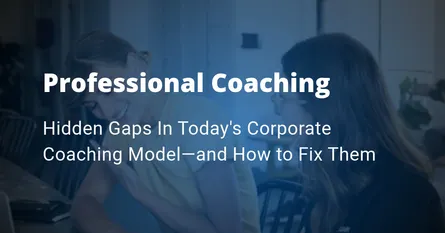
Coaching

The Hidden Gaps In Today's Corporate Coaching Model—and How to Fix Them
- 03 Apr, 2025
- Talent development
Corporate coaching, professional coaching, executive coaching -- whatever you'd like to call it -- coaching in the workplace has long been a cornerstone of leadership development, helping individuals overcome challenges, gain self-awareness, and accelerate their professional growth. The U.S. business coaching market is worth $14.2 billion, growing at 2.6% annually with around 65% of professional coaches focused on business and leadership coaching. Coaching's popularity underscores its perceived value. However, the current approach to coaching in the workplace often falls short as a one-size-fits-all solution—not just for managers and people leaders but for employees at every level of an organization. The gaps in traditional coaching models highlight the need for more personalized, scalable, and actionable solutions that align with the future of work. Gap 1: The Philosophical Limitations of Coaching Coaching’s foundational philosophy emphasizes reflective questioning and creating space for individuals to uncover their own wisdom. While this approach can spark meaningful insights for some, employees under pressure often need quick, specific advice that coaching’s non-directive methodology cannot provide in real time. For example, when faced with urgent decisions or interpersonal conflicts, employees may struggle to translate reflective insights into immediate solutions. Moreover, coaches typically rely on secondhand accounts of workplace dynamics provided by their clients. This reliance limits the coach’s ability to offer actionable guidance rooted in the broader context of team interactions, organizational goals, and cultural nuances—a gap that affects employees across all roles. Gap 2: The Disconnect Between Coaching & Organizational Context One of the key benefits of coaching is its ability to foster trust and deeper self-awareness through one-on-one relationships. However, its effectiveness is inherently constrained by the coach's limited understanding of the employee’s day-to-day environment. Coaches often lack firsthand knowledge of organizational policies, processes, and culture, which can lead to generic advice that fails to address unique challenges faced by employees. According to Gartner, incorporating corporate context into development opportunities can boost performance by 35%, yet this critical element is often missing from traditional coaching relationships. Gartner recommends that organizations integrate their culture into everyday behaviors and processes, including coaching to transform values into tangible practices. Companies that successfully integrate culture into their operations report a 63% increase in employee engagement, along with substantial boosts in employee performance and retention. Gap 3: Outdated Insights and Limited Scalability Even the most experienced coaches may struggle to stay current with evolving research and best practices in organizational psychology. Employees today face increasingly complex challenges—from navigating hybrid work environments to managing mental health concerns—and require guidance informed by real-time evidence-based insights. Traditional coaching methods often fall short in addressing these rapidly changing needs. Additionally, the fixed-schedule nature of coaching sessions creates a disconnect between when problems arise and when employees can access support. This delay forces individuals to navigate critical situations without immediate guidance, potentially leading to suboptimal decisions that impact team performance and business outcomes. Scalability presents another challenge: premium costs and time constraints make it difficult for organizations to provide coaching access to all employees who could benefit from it. As a result, only a select few receive support, limiting the overall impact on organizational growth and employee satisfaction. Gap 4: Generic Guidance from AI Coaching Tools To address scalability issues, some organizations have turned to AI-powered coaching solutions. While these tools aim to mimic human coaches by asking reflective questions or providing basic guidance, they often fall short due to their mechanical and impersonal nature. Employees may find these interactions frustrating because they lack the nuanced understanding and adaptability that human coaches bring. A New Approach: Psychometrics + AI Humantelligence offers a transformative solution designed for all employees—including executive leadership, managers, and individual contributors—by leveraging AI-powered technology that provides personalized, timely, and practical support at scale. Unlike traditional coaching methods or generic AI chatbots, Humantelligence integrates behavioral science (psychometrics) with real-time data insights to deliver actionable recommendations tailored to each individual’s unique preferences, abilities, work styles, motivators, and goals. With this modern approach to coaching and development:Employees have instant access within the tools they're already using to the feedback and guidance needed to navigate workplace challenges and stop conflicts before they even start. Teams benefit from enhanced collaboration tools that align with organizational culture. Leaders at all levels can make informed decisions based on unbiased data about team dynamics.This innovative approach bridges the gaps left by traditional coaching by providing solutions that are scalable across entire organizations while maintaining personalization and relevance. Key benefits include:Improved leadership & team effectiveness Less consultants and workshops (save $$) More effective onboarding, important for retention Less turnover and disengagementWhat's more, because this virtual AI coach is accessible to ALL employees, not just the high potential, companies can experience more than 3x the return on investment across the entire enterprise. Empowering Employees for Success As businesses continue to evolve in response to new challenges, it is clear that the traditional approach to professional coaching alone cannot meet the diverse needs of today’s workforce. Employees require development tools that offer real-time support grounded in organizational context while fostering personal growth and team performance. Humantelligence’s AI-powered platform empowers every employee to thrive in dynamic environments by delivering insights that drive better outcomes for individuals and organizations alike. Ready to start bridging the gaps? Explore how Humantelligence can transform your approach to employee development today!